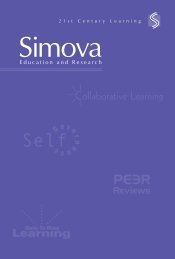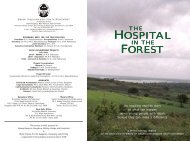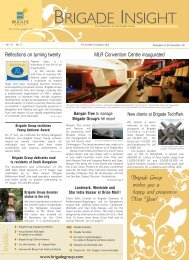Janaagraha - Resource Communications Pvt. Ltd
Janaagraha - Resource Communications Pvt. Ltd
Janaagraha - Resource Communications Pvt. Ltd
Create successful ePaper yourself
Turn your PDF publications into a flip-book with our unique Google optimized e-Paper software.
J A N A AG R A H A C E N T R E F O R C I T I Z E N S H I P A N D D E M O C A R C Y<br />
I N T R O D U C T I O N<br />
04 05<br />
We are all shareholders in<br />
government, except that we can<br />
never sell our shares.<br />
will have resistance to sharing these spaces with less privileged groups there is certainly<br />
merit in adopting an approach that brings the less privileged groups into such spaces as<br />
part of an inclusive argument based on democratic processes, rather than an aggressive<br />
one. While this approach does not guarantee immediate success, it holds significant<br />
potential.<br />
It moves closer to the ideal of inclusive spaces immediately, since all processes are<br />
inclusive in methodology and spirit. A more aggressive one will require integration<br />
between these groups.<br />
The work itself does not result in the sharpening of conflict between the groups, and<br />
the creation of possible negative energies in the process.<br />
It recognises that while there may be differences between different groups of citizens<br />
in terms of access to services and even democratic spaces, neither group today has any<br />
formal voice or space to participate in decision-making.<br />
Given <strong>Janaagraha</strong>'s views on democracy, there is a need for substantial change in<br />
how public institutions create spaces for such citizen-voice and engagement. This will<br />
require an enormous amount of work to be done both in the grassroots and at the level<br />
of advocacy to change this. This work will need multiple skills and time, which the poor<br />
alone do not possess. Bringing the middle-class into the governance vacuum to address<br />
these issues fulfils the criterion of being truly inclusive, and also ensures that such skills<br />
and time are used to build the foundation of formal space for citizens. Once this<br />
space is created, it will be for ALL citizens, including the poor. Along the way,<br />
additional effort is required to bring the poor into such spaces in a manner that is<br />
non-threatening, and to sensitise the non-poor to recognise the legitimacy and priority<br />
of the needs of the poor.<br />
At an individual level, such an approach is premised on the fundamental goodness<br />
of people, rather than one driven by creating checks and balances on human behaviour.<br />
This approach may not necessarily be valid in every situation, or even work effectively.<br />
However, the same can be said for the exclusive approach as well. In choosing between<br />
these two, specifically within this dimension of human instinct, <strong>Janaagraha</strong>'s approach is<br />
to choose one that is more oriented towards peace. This is also consistent with the<br />
belief that participation creates a just and caring society. Here, our belief is that when<br />
the right spaces and processes of democracy are created for public discussion, they ignite<br />
the inherent goodness in people.<br />
Hence, <strong>Janaagraha</strong>'s approach has been to attempt to bring in all stakeholders of a<br />
city together, however antagonistic they may be to each other: industry representatives,<br />
slum-dwellers, the NGO sector, academia and technical experts, as well as local<br />
government and other special agencies that have responsibility for urban services.<br />
While aspiring to an ideal democratic structure, <strong>Janaagraha</strong>'s approach is a pragmatic<br />
one, that looks at opportunities to create change in the direction of the ideals of greater<br />
centrality to the citizen in decision-making, chipping away at the edifice of the current<br />
structure, and yet not taking an anarchic or radical view of change. The belief is that<br />
this pragmatism does not require a compromise of integrity; that a more pure form of<br />
the solution will emerge iteratively.<br />
Hence, while change is not continuous, the pressures for change need to be<br />
relentless.<br />
J A N A A G R A H A ' S I M PA C T<br />
<strong>Janaagraha</strong> is designing performance metrics that can help us evaluate the success of our<br />
medium and long-term goals. The challenging task of measuring work in the non-profit<br />
sector is especially difficult when it comes to measuring attitudinal changes among<br />
various stakeholders—citizens, elected representatives, political parties, administrators<br />
etc.<br />
<strong>Janaagraha</strong> completed four years of existence in December 2005. Highlights of the<br />
outcomes of our work over these past few years are:<br />
1. Grassroot community-based activities<br />
a. Ward planning and budgeting: In its first phase, called the Ward Works<br />
campaign, <strong>Janaagraha</strong> took one item of the city's budget (about 6%) and the<br />
citizens' voice was brought into the selection, prioritisation and implementation<br />
of various local area works. Results: 22% of the city's Ward Works budget (Rs 11<br />
crores out of Rs 50 crores) was decided by citizens. In its second phase, called the<br />
Ward Vision campaign, <strong>Janaagraha</strong> completed one of the most comprehensive<br />
citizen-centric (over 2,000 citizens took part) workshop-driven approaches in<br />
participatory planning, to generate ten ward-level, 3-year vision documents. In<br />
addition, grassroot communities and networks were formed and strengthened in<br />
ten of the city's 100 wards—these have benefits that go beyond the tangible<br />
outputs of budgets and plans.<br />
b. Ward Sabhas: <strong>Janaagraha</strong>'s model of participatory democracy is about structured<br />
citizen engagement at the ward level. While <strong>Janaagraha</strong> is advocating<br />
amendments to municipal acts that legitimise citizen participation in Bangalore,<br />
I am of the opinion that it is<br />
<strong>Janaagraha</strong> which taught us (me in<br />
particular) regarding the various<br />
levels and functions of the<br />
government. I did not even have a<br />
fair idea about the basis of ward<br />
formations, ward committees, our<br />
importance in interacting with<br />
various departments etc. Hence I<br />
unconditionally owe it to<br />
<strong>Janaagraha</strong> for making me aware of<br />
these facts.<br />
—Mr Gurudas<br />
Volunteer















